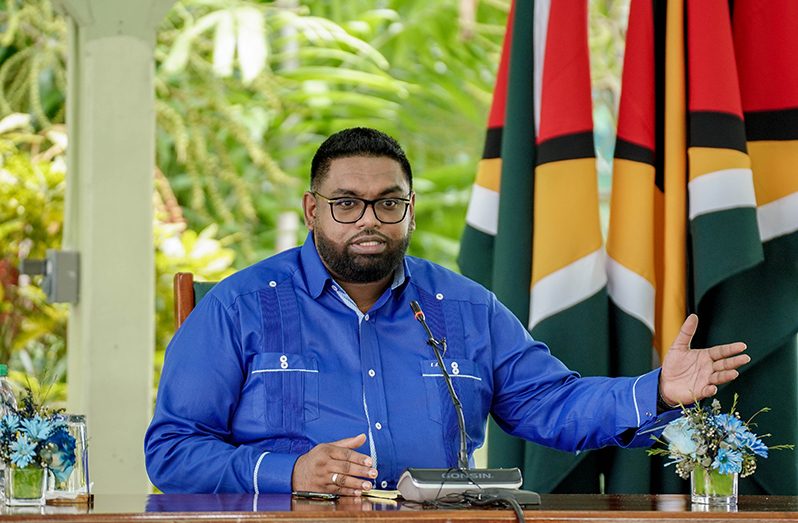—says President Ali, hints that Guyana could manage some blocks independently
PRESIDENT, Dr. Irfaan Ali has said that when the government is ready to award new oil blocks, the process will be done transparently to ensure that Guyana gets the best deal.
He said that in response to questions from the media at a Presidential Press Conference held at State House, on Wednesday.
“We have made it very clear that the process in awarding new oil blocks will be very much different. It will be an open, public process and when we get to that stage it will be a public, open bidding process. We will be looking for the best offer in an open public bid,” President Ali said.
As it is now, ExxonMobil is the operator of the Stabroek, Canje and Kaieteur Blocks offshore Guyana. Since 2015, the company has increased its estimated recoverable resource base in Guyana to more than nine billion oil-equivalent barrels. Further, CGX, together with Frontera Energy Corporation, operates the Corentyne and Demerara blocks, and also has a share in the Berbice block.
In moving forward, President Ali said that the government has preliminarily discussed whether Guyana will retain some of the remaining oil blocks.
“…Discussions are still ongoing… it calls for a lot of technical analysis on whether Guyana itself will retain some of those blocks for our own development and to manage by ourselves, but that is very preliminary,” he related. The President was questioned extensively on the oil-and-gas sector, especially on how the revenues will be spent.
To this, the Head of State said that the oil revenues must be used to strengthen existing opportunities in Guyana and to open new opportunities for investment, economic growth and social development, among other areas. “In creating those opportunities, we have to ensure that there is equity and there is no widening between those who have and those who don’t have… the resources have to be used to close that gap. So, healthcare, education, food security, housing—these are all areas that are critical to closing that gap,” President Ali posited.
He further related that new opportunities will be opened for ownership of land, farming and other agriculture, and for Guyana to realise its potential of becoming the prime supplier of food regionally.
The Head of State added that resources must also be used to open up new opportunities in the development of the manufacturing and industrial sectors. These include the cost of energy, which will lower the cost of production and enhance global competitiveness. “We have to look at how we make investment to create the energy mix that would not only satisfy our local demand, but that will be part of the energy corridor that is currently being discussed along with the Guiana Shield,” President Ali reasoned. The President said that the government is also focusing heavily on the improvement of national infrastructure. To this end, he said: “We cannot continue losing thousands of man-hours every day in traffic. We have to understand that our country is growing, that the need for infrastructure is expanding. So, these are the areas that we have to target.”
The President added that while the template for the oil revenue has been outlined, there are several things, including the establishment of a Petroleum Commission, finalising of the legislation for the Sovereign Wealth Fund, among other things, that need to be done before the spending of any oil revenue.
He emphasised that at this moment, the government is not relying on oil revenue to meet the budgetary expenditure, and that when the macro development plan is laid out later in the year, that discussion will take place. Based on a consolidation of all the country’s oil lifts to date, it has sold some 5,009,797 barrels of oil valuing US$246,542,662. Along with the earnings from the oil lifts, and over US$21 million in royalties and interest, Guyana has close to US$267,668,709 in its Natural Resources Fund (NRF) at the U.S. Federal Reserve Bank. [Office of the President]












